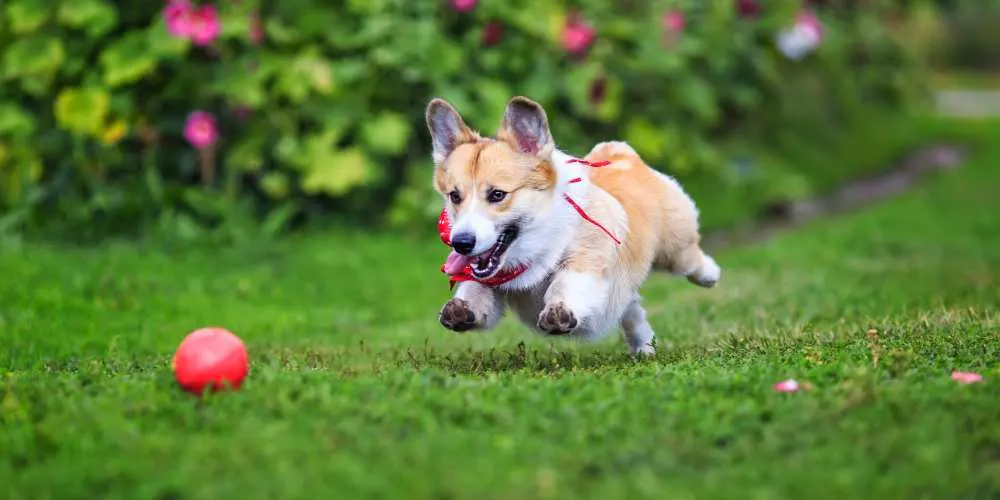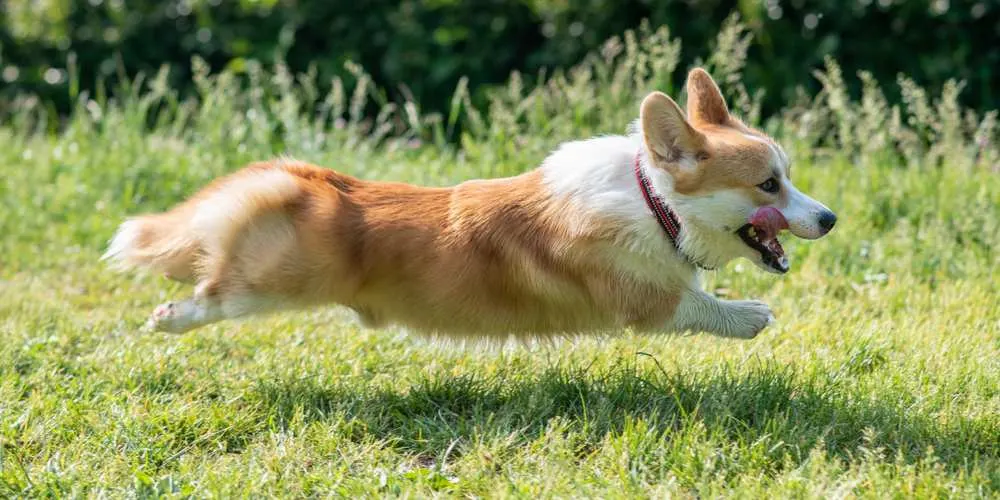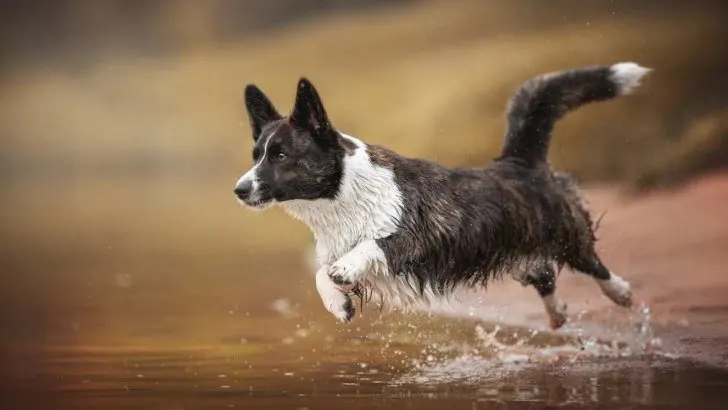Whenever you take your corgi for a walk to the dog park, you will stumble upon other dogs. Every dog in the dog park will have its unique personality and physical predispositions. Larger dogs will dominate the scene, and smaller ones will follow them.
You might notice that your corgi is running rather strangely compared to how other dogs are running. That might inspire you to think, “Why do corgis hop?”. Can hopping affect them in any shape or form?
Corgis have long bodies and short legs, forcing them to occasionally hop while they are running.
It’s not their choice to do so, as corgis are born like that. What exactly forces corgis to hop? If it’s dangerous for them to hop, can you help them somehow? Is there a way to prevent the hopping in corgis?
In most cases, hoping isn’t dangerous to corgis, but sometimes, it can be directly connected to a specific bone disease. Do you want to find out what this disease is? The answer is hidden below; start scrolling!

Corgis’ Anatomy
No matter how big or small it is, every dog breed has its own specific set of characteristics that define how they will turn out when they grow up. Dogs with thick fur will stay warmer in the winter than dogs with short fur that will require a blanket when winter comes.
Medium-size and large dogs will be faster and stronger when comparing them to their smaller dog friends. Genetics is responsible for all of the attributes that all dogs will have. Humans with blue or green eyes are more likely to make babies that won’t have brown eyes.
Corgis particularly have attributes that set them apart from other dogs. The main one being their long bodies and short legs. However, it might seem funny to us when we see how corgis exhibit their bunny hop while walking. Corgis might not enjoy that too much.
As it turns out, all corgis tend to hop sometimes when they are walking or running. They must do that, as the formation of their bones is placed in a manner that requires them to hop from time to time. In rare cases, when corgis are hopping, it might be a sign of hip dysplasia.
Whenever you see an animal with a long body and short legs, it will have a chance to develop hip dysplasia. It’s a common disease that can occur in all dogs, and corgis aren’t exempt from that.
Every hip joint is connected with a ball and a socket. Whenever a corgi moves, it will inevitably use the joints in the hips to move its body. When the brain forces the legs of the corgis to move, the ball will start to slide from one end to the other and smoothly rotate in the hip’s socket.
If the ball is unnaturally rubbing the socket, the manifestation of hip dysplasia will occur at some point in the corgis’ lives. To prevent that from happening, you will need to react fast when you see that your corgi starts to behave oddly.
Sending your corgi to your local veterinarian will be the best solution, as he can run some tests and x-rays to determine if something is wrong. Luckily for corgis, in most cases, the scan won’t show a problem regarding hip dysplasia.
On the off chance that the results came in negative, and the veterinarian says that the hip dysplasia entered its final stage, you will need to give the green light to surgical intervention. It’s a successful treatment but can get rather costly; be prepared to pay up to 5000 dollars.
So, what does this have to do with corgis that hop? As I’ve stated earlier, every corgi will tend to hop, no matter if it entered a stage of hip dysplasia or not. Their anatomy doesn’t allow them to properly walk and run all the time, as their hip joints have a limited usage time.
Corgis are energetic dogs – although they tend to stay on their feet throughout the day, they need to rest sometimes. If you let your dog run and exercise too much, the joints in their hips will deteriorate quickly, resulting in potential hip dysphoria.
The hip dysphoria is the main thing that leads corgis to hop. Whenever you take your corgi for a walk, you might notice that it wiggles the legs on the back. It’s a regular occurrence – the internet is full of sites that joke around regarding corgis tendency to wiggle their buts!

Strengthen The Muscles And Tendons Of Corgis
If you notice that your corgi is hopping while running, it might be a clear sign that hip dysplasia is starting to form. Many things affect that, beginning with an improper diet for corgis. All dogs need to eat adequately to sustain themselves throughout the day.
Corgis are voracious creatures – they tend to eat more food than they should, resulting in them becoming potentially fat. Any excess fat that doesn’t get processed will stay behind and deposit under the skin of the corgis and on their internal organs.
As the corgis are gradually becoming fatter and fatter, they will inevitably get close to being obese. Unfortunately, most corgis scattered throughout the world suffer from this condition, as many owners don’t care enough for their dogs.
Putting your corgi in a state of risk of this caliber can result in other problems – especially ones regarding hip joints. Every corgi that suffers from a significant amount of excess weight will have to walk and run oddly.
In most cases, corgis that are obese will hop when they are moving somewhere. If you notice that your corgi is starting to get larger and larger with every passing day, you will need to start considering a change in corgis’ food regime.
Offering corgis more food than they should eat should be avoided at all costs, as corgis don’t know when to stop eating. Their tendency to overeat is a mistake, originating from the owners’ mistakes who allowed their dogs to fill up on tons of food in a short period.
Go to your local pet shop and buy commercial dog food for your corgi, specifically recommended by the people who work there. Cut the amount of food you offer to your corgis whenever they need to eat and start exercising them more frequently.
The lack of food and more exercise will lead to a potential rehabilitation process of the hip joints, resulting in less corgi hopping. Remember – just because your corgis are hopping when they are running doesn’t mean they have a problem with their hip joints.
It’s common sense that corgis need to have a good posture. It will need to exercise daily and eat lots of healthy food to maintain and build optimal muscle mass throughout its entire life. Believe it or not, muscles are responsible for keeping them more resilient to bone diseases!
Learn More: Are Corgis Prone To Joint Problems?

How To Prevent Corgis From Hopping Too Much?
If you are still concerned about the hopping present while your corgi is running, I will present you with several solutions:
- Whenever you take your corgi for a walk in the park, use a short leash. By doing so, you will make sure that your corgi won’t unnecessarily run all the time. Take things easy and leash them tightly to prevent hopping.
- Teach your corgi always to stay close to you. If your corgis match the speed of your walk, they won’t hop anytime soon.
- It’s wise to pay close attention to the behavior of your corgi when it’s roaming freely in the dog park. Most dogs tend to get close to a corgi and meet him, as corgis are built differently, which is attractive to many other dogs.
- Those dogs, while sniffing your corgi, might rub the corgis’ feelings in a wrong way, resulting in a fight between dogs. Any injuries that your corgis sustain in a dog fight can put them in further danger regarding the hip joints.
- Never panic! You must remember that, in most cases, it’s OK if your corgis are hopping. The overall constitution of their bones doesn’t allow them to move elegantly, resulting in occasional hopping when they are running.
Most dogs will hop when they are charging towards you. When that happens, it will be a clear sign that your corgi is excited to see you or to find out what you are holding in your hands. Don’t worry too much – most of the time; it’s normal for corgis to hop!
Learn More: Can Corgis Jump High? How High Can Corgis Jump?

Why Do Corgis Hop? – To Sum Up
Owners need to be extra careful when taking a corgi for a walk to the dog park. If you notice that your corgi is moving oddly, you should call your local veterinarian. You might’ve heard the term hopping, which might interest you; why do corgis hop?
Corgis are sometimes forced to hop while they run because they have short legs with delicate hip joints. These joints need to function for them to walk and run properly. If your corgi is experiencing hip dysphoria, it will have a difficult time running correctly.
Every dog that has been offered a healthy and balanced diet won’t have to worry about whether it will have enough stamina to run all day long. Some dogs don’t have this luxury, particularly corgis, who need to rest whenever they feel tired, as overexerting them can lead them to develop hip dysplasia.
Only on rare occasions can corgis’ hopping mean the manifestation of hip dysplasia, so don’t worry. Stay close to your corgi and listen if they are in pain!
See Also: Why Does My Corgi Jump Around?

